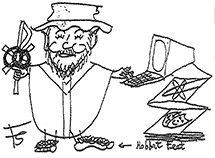About ten years ago, there appeared after a church a cake, inscribed: “Graham, 40 years a Fool for Christ!” - my fortieth anniversary of ordination!
In the first letter to the Corinthians, St Paul describes the preaching of Christ crucified as a scandal (stumbling-block) to the Judeans and moronic (foolishness) to the Greeks, but to the “called”, both Judeans and Greeks, Christ is the power of God and the wisdom of God. “For the foolishness of God is wiser than the human [wisdom], and the weakness of God is stronger than the human [strength].”[20] Christians are prepared to look foolish, and when needed, play the fool.
What has been lacking in Christian practice, except in a few nooks and crannies where cheerfulness breaks through, and almost totally lacking in Christian theology, is a sense of fun. If what we do is foolishness to the world, we should be completely hilarious about it. Perhaps we have been so preoccupied with “proving” this and that from scriptural proof-texts to “explain” why Jesus did this or that. Perhaps we have been looking over our Christian shoulders to see the current dictators of the politically correct - instead of laughing our heads off at the wonderful ironies of life.
When we enter into a new stage or level of human existence, we can look back on the contradictions of our previous state, understand them, and laugh at them. The laughter is not deprecatory: it is a sign of release; it is the key signature of joy in new and renewed existence. We should laugh that we have replaced gladiatorial combat with competitive games, infanticide with family planning, women as non-persons with a spreading feminism, competitiveness with cooperation, monolithic religious feudalism with pluralism and agnosticism, and hundreds of other changes which have improved or can improve the human condition.
Unfortunately, most human beings live a single-level existence as far as their consciousness is concerned. All of humanity lives a multilevel existence unconsciously - energy quanta, molecules, mitochondria, cells, organs, nervous system, algorithmic unconscious, habit, social pressures, etc. In the interrelationship of these “laughter” is the jump of joy in transcendence, the release from compression when the wave functions collapse and new realities are born. There is a kind of pre-laughter going on all through our deep selves as these various levels interact, bootstrap, meet contingencies, empty themselves, achieve new life. When laughter fails, our bodies and minds are sick.
But most of us live consciously at just one level: we do not allow our inner eye to dance with light. The best exceptions are games and music when we are taken out of ourselves into other existences. For the rest, in what might be called our thinking, we live monotonously, and that monotony is the mental equivalent of entropy, which is death of energy. The remedy, lateral thinking, is parallel to non-equilibrium bifurcation in thermodynamics, and it is both fun and funny.
I do not think it is possible fully to be part of a worshiping community, or a sacramental offering of worship, without inner laughter. We may dress it up as “joy” or “solemnity”, but at root, it is both personal and cosmic laughter, a dancing together of the sons and daughters of God at the rising of new life.
God, who is at the end and the beginning of our consciousness and our life, has the biggest laugh of all. God laughs at the ridiculously sublime behaviour of all parts of the creation, from quanta popping in and out of existence in a vacuum, via bower-birds and human love-making to the solemn antics of politicians, ecclesiastics and authors.
To know God, it helps to be aware of our own mixed-up levels, be aware of the ironies of existence, chuckle as we “ believe several impossible things before breakfast,”empty” ourselves with those who weep, rise up and dance with those who are joyful - in laughter.
SPECIAL WORDS
energy quanta: packets of energy which are the smallest amounts possible.
molecules: cells or groups of cells working together.
mitochondria: small bodies inside cells which convert food to energy.
algorithmic unconscious: automatic neurological or mental responses.
the wave function’s collapse: one way of describing how a packet of energy takes shape in constructing ”things.”

